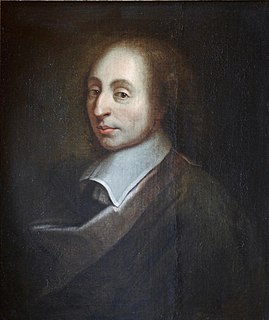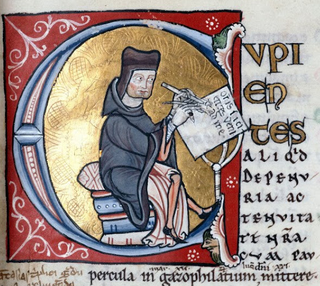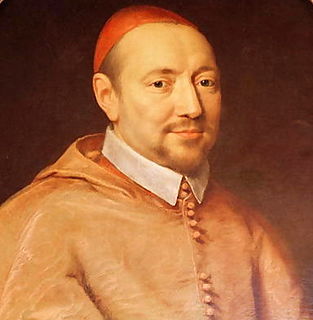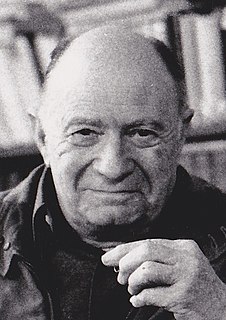
Blaise Pascal was a French mathematician, physicist, inventor, philosopher, writer and Catholic theologian.

The College of Sorbonne was a theological college of the University of Paris, founded in 1253 by Robert de Sorbon (1201–1274), after whom it was named.

Jansenism was a theological movement within Catholicism, primarily active in France, that emphasized original sin, human depravity, the necessity of divine grace and predestination. The movement originated from the posthumously published work of the Dutch theologian Cornelius Jansen, who died in 1638. It was first popularized by Jansen's friend Abbot Jean du Vergier de Hauranne, of Saint-Cyran-en-Brenne Abbey, and, after du Vergier's death in 1643, was led by Antoine Arnauld. Through the 17th and into the 18th centuries, Jansenism was a distinct movement away from the Catholic Church. The theological center of the movement was the convent of Port-Royal-des-Champs Abbey, which was a haven for writers including du Vergier, Arnauld, Pierre Nicole, Blaise Pascal and Jean Racine.

The University of Paris, metonymically known as the Sorbonne, was the main university in Paris, France, active from 1150 to 1970, with the exception of 1793–1806 under the French Revolution. In 2019, University of Paris V and University of Paris VII merged to form a new University of Paris, leaving the number of successor universities at 11. In 2017, University of Paris IV and University of Paris VI merged to form Sorbonne University.

Encyclopédie, ou dictionnaire raisonné des sciences, des arts et des métiers, better known as Encyclopédie, was a general encyclopedia published in France between 1751 and 1772, with later supplements, revised editions, and translations. It had many writers, known as the Encyclopédistes. It was edited by Denis Diderot and, until 1759, co-edited by Jean le Rond d'Alembert.

Isidore Marie Auguste François Xavier Comte was a French philosopher and writer who formulated the doctrine of positivism. He is often regarded as the first philosopher of science in the modern sense of the term. Comte's ideas were also fundamental to the development of sociology; indeed, he invented the term and treated that discipline as the crowning achievement of the sciences.

Jean Henri Gaston Giraud was a French artist, cartoonist, and writer who worked in the Franco-Belgian bandes dessinées (BD) tradition. Giraud garnered worldwide acclaim under the pseudonym Moebius, as well as Gir outside the English-speaking world, used for the Blueberry series—his most successful creation in the non-English speaking parts of the world—and his Western-themed paintings. Esteemed by Federico Fellini, Stan Lee, and Hayao Miyazaki, among others, he has been described as the most influential bandes dessinées artist after Hergé.

Giles of Rome O.S.A., was a Medieval philosopher and Scholastic theologian and a friar of the Order of St Augustine, who was also appointed to the positions of Prior General of his Order and as Archbishop of Bourges. He is famed as being a logician, producing a commentary on the Organon by Aristotle, and for his authorship of two important works, De Ecclesiastica Potestate, a major text of early 14th century Papalism, and De Regimine Principum, a guide book for Christian temporal leadership. Giles was styled Doctor Fundatissimus by Pope Benedict XIV.

Jean Paul Gustave Ricœur was a French philosopher best known for combining phenomenological description with hermeneutics. As such, his thought is within the same tradition as other major hermeneutic phenomenologists, Edmund Husserl and Hans-Georg Gadamer. In 2000, he was awarded the Kyoto Prize in Arts and Philosophy for having "revolutionized the methods of hermeneutic phenomenology, expanding the study of textual interpretation to include the broad yet concrete domains of mythology, biblical exegesis, psychoanalysis, theory of metaphor, and narrative theory."

Peter Lombard, was a scholastic theologian, Bishop of Paris, and author of Four Books of Sentences which became the standard textbook of theology, for which he earned the accolade Magister Sententiarum.

Yves Marie-Joseph Congar was a French Dominican friar, priest, and theologian. He is perhaps best known for his influence at the Second Vatican Council and for reviving theological interest in the Holy Spirit for the life of individuals and of the church. He was created a cardinal of the Catholic Church in 1994.

Alexander Dmitrievich Schmemann was an influential Orthodox Christian priest, teacher, and writer who had most of his career in the United States. Born in Estonia to émigrés from the Russian Revolution, he grew up primarily in France, where there was a large émigré community in Paris. After being educated there in both Russian and French schools and universities, from 1946 to 1951 he taught in Paris. That year he immigrated with his family to New York City to teach at Saint Vladimir's Orthodox Theological Seminary. In 1962 he was selected as dean of the Seminary, serving in this position until his death. For 30 years, his sermons in Russian were broadcast by Radio Liberty into the Soviet Union, where they were influential as a voice from beyond the Iron Curtain.

Pierre de Bérulle, was a French Catholic priest, cardinal and statesman, one of the most important mystics of the 17th century in France. He was the founder of the French school of spirituality, who could count among his friends and disciples Vincent de Paul and Francis de Sales.

Jacques Ellul was a French philosopher, sociologist, lay theologian, and professor who was a noted Christian anarchist. Ellul was a longtime Professor of History and the Sociology of Institutions on the Faculty of Law and Economic Sciences at the University of Bordeaux. A prolific writer, he authored more than 60 books and more than 600 articles over his lifetime, many of which discussed propaganda, the impact of technology on society, and the interaction between religion and politics. The dominant theme of his work proved to be the threat to human freedom and religion created by modern technology. Among his most influential books are The Technological Society and Propaganda: The Formation of Men's Attitudes.

John Meyendorff was a leading theologian of the Orthodox Church of America as well as a writer and teacher. He served as the dean of St. Vladimir's Orthodox Theological Seminary in the United States until June 30, 1992.

Emmanuel Mounier was a French philosopher, theologian, teacher and essayist.
Rubem Azevedo Alves was a Brazilian theologian, philosopher, educator, writer and psychoanalyst. Alves was one of the founders of liberation theology.

Humanism in France found its way from Italy, but did not become a distinct movement until the 16th century was well on its way.
John of Paris, also called Jean Quidort and Johannes de Soardis, was a French philosopher, theologian, and Dominican friar.

Josephology is the theological study of Joseph, the husband of Mary, mother of Jesus. Records of devotions to Joseph go back to the year 800 and Doctors of the Church since Thomas Aquinas have written on the subject. With the growth of Mariology, the theological study of Joseph also grew and in the 1950s specific centers for it were formed. The modern study of the theology concerning Joseph is one of the newest theological disciplines.

















